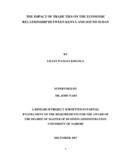| dc.description.abstract | South Sudan made an application to be a member of EAC and other strategic international and regional bodies in an effort to participate in the global economy. South Sudan recently joined in 2016. However, no known documented study has dwelt into the economic relationship that Kenya has with South Sudan as a result of their trade ties. The aim of this study was to determine the impact of trade ties on the economic relationship between Kenya and South Sudan. The theories that underpinned this study were the Davis Ricardo’s Comparative Advantage Theory and the Factor Endowment Theory by Heckscher and Ohlin. The study adopted the descriptive research design. This research used case study design whose target population consisted of officers in the Ministry of Foreign Affairs and International Trade. Out of the 45 respondents sampled for this study, this study managed 36 interviews. This study used both primary and secondary data. For the primary data, this was collected the interview guide which was administered to staff serving in the Kenyan Ministry of Foreign Affairs and International Trade. Data collected was analyzed using content analysis. Findings reveal that the products majorly exported from Kenya to South Sudan are in seven sectors. These are agriculture (23 percent), real estate (19 percent), transport and storage (15 percent), construction (13 percent), financial services (11 percent), manufacturing (10 percent) and information and communication (9 percent). It is clear that bilateral relations between Kenya and South Sudan are premised on social, political and economic factors. Also, findings revealed that balance of trade between Kenya and South Sudan is in Kenya’s favour Furthermore, the role played by Kenyan in seeing the Nairobi 2005 Compressive Peace Agreement a reality leading to the birth of South Sudan as an independent state as well as eventual achievement of peace in the South is a key ingredient for trade ties and sustained economic relations between these two states and that Kenya has an advantage in terms of strategic location and excess human resource endowments in Kenya’s health and education sectors laying the basis for sustained trade ties and economic relation between these two countries. This study concludes that economic relations between Kenya and South Sudan cannot be sustained without trade ties as beneficial trade ties between these two nations will inform positive economic relationships. The study recommends that Kenya initiates bilateral trade agreement with South Sudan with the EPC as the Kenya’s export promotion body, charged with facilitating bilateral negotiations between Kenya and South Sudan involving protection of trade and investments and businesses made by partners in both home markets. It further recommends that Kenya mediates in the Machar and Kiir conflict so as to promote her image which will in turn reduce xenophobic attacks, increase peace and security and allow Kenyan traders penetrate the market further. Given that this study only concentrated on the trade ties between Kenya and South Sudan. | en_US |



